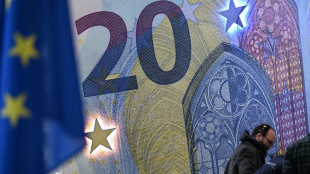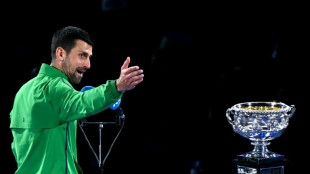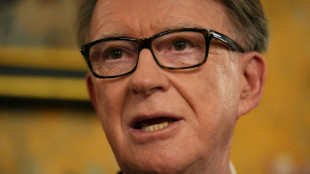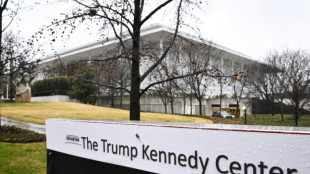-
 British singer Olivia Dean wins Best New Artist Grammy
British singer Olivia Dean wins Best New Artist Grammy
-
Hatred of losing drives relentless Alcaraz to tennis history

-
 Kendrick Lamar, Bad Bunny, Lady Gaga win early at Grammys
Kendrick Lamar, Bad Bunny, Lady Gaga win early at Grammys
-
Surging euro presents new headache for ECB

-
 Djokovic hints at retirement as time seeps away on history bid
Djokovic hints at retirement as time seeps away on history bid
-
US talking deal with 'highest people' in Cuba: Trump

-
 UK ex-ambassador quits Labour over new reports of Epstein links
UK ex-ambassador quits Labour over new reports of Epstein links
-
Trump says closing Kennedy Center arts complex for two years

-
 Reigning world champs Tinch, Hocker among Millrose winners
Reigning world champs Tinch, Hocker among Millrose winners
-
Venezuelan activist ends '1,675 days' of suffering in prison

-
 Real Madrid scrape win over Rayo, Athletic claim derby draw
Real Madrid scrape win over Rayo, Athletic claim derby draw
-
PSG beat Strasbourg after Hakimi red to retake top spot in Ligue 1

-
 NFL Cardinals hire Rams' assistant LaFleur as head coach
NFL Cardinals hire Rams' assistant LaFleur as head coach
-
Arsenal scoop $2m prize for winning FIFA Women's Champions Cup

-
 Atletico agree deal to sign Lookman from Atalanta
Atletico agree deal to sign Lookman from Atalanta
-
Real Madrid's Bellingham set for month out with hamstring injury

-
 Man City won't surrender in title race: Guardiola
Man City won't surrender in title race: Guardiola
-
Korda captures weather-shortened LPGA season opener

-
 Czechs rally to back president locking horns with government
Czechs rally to back president locking horns with government
-
Prominent Venezuelan activist released after over four years in jail

-
 Emery riled by 'unfair' VAR call as Villa's title hopes fade
Emery riled by 'unfair' VAR call as Villa's title hopes fade
-
Guirassy double helps Dortmund move six points behind Bayern

-
 Nigeria's president pays tribute to Fela Kuti after Grammys Award
Nigeria's president pays tribute to Fela Kuti after Grammys Award
-
Inter eight clear after win at Cremonese marred by fans' flare flinging

-
 England underline World Cup
credentials with series win over Sri Lanka
England underline World Cup
credentials with series win over Sri Lanka
-
Guirassy brace helps Dortmund move six behind Bayern

-
 Man City held by Solanke stunner, Sesko delivers 'best feeling' for Man Utd
Man City held by Solanke stunner, Sesko delivers 'best feeling' for Man Utd
-
'Send Help' debuts atop N.America box office

-
 Ukraine war talks delayed to Wednesday, says Zelensky
Ukraine war talks delayed to Wednesday, says Zelensky
-
Iguanas fall from trees in Florida as icy weather bites southern US

-
 Carrick revels in 'best feeling' after Man Utd leave it late
Carrick revels in 'best feeling' after Man Utd leave it late
-
Olympic chiefs admit 'still work to do' on main ice hockey venue

-
 Pope says Winter Olympics 'rekindle hope' for world peace
Pope says Winter Olympics 'rekindle hope' for world peace
-
Last-gasp Demirovic strike sends Stuttgart fourth

-
 Sesko strikes to rescue Man Utd, Villa beaten by Brentford
Sesko strikes to rescue Man Utd, Villa beaten by Brentford
-
'At least 200' feared dead in DR Congo landslide: government

-
 Coventry says 'sad' about ICE, Wasserman 'distractions' before Olympics
Coventry says 'sad' about ICE, Wasserman 'distractions' before Olympics
-
In-form Lyon make it 10 wins in a row

-
 Man Utd strike late as Carrick extends perfect start in Fulham thriller
Man Utd strike late as Carrick extends perfect start in Fulham thriller
-
Van der Poel romps to record eighth cyclo-cross world title

-
 Mbappe penalty earns Real Madrid late win over nine-man Rayo
Mbappe penalty earns Real Madrid late win over nine-man Rayo
-
Resurgent Pakistan seal T20 sweep of Australia

-
 Fiji top sevens standings after comeback win in Singapore
Fiji top sevens standings after comeback win in Singapore
-
Alcaraz sweeps past Djokovic to win 'dream' Australian Open

-
 Death toll from Swiss New Year bar fire rises to 41
Death toll from Swiss New Year bar fire rises to 41
-
Alcaraz says Nadal inspired him to 'special' Australian Open title

-
 Pakistan seeks out perpetrators after deadly separatist attacks
Pakistan seeks out perpetrators after deadly separatist attacks
-
Ukraine war talks delayed to Wednesday, Zelensky says

-
 Djokovic says 'been a great ride' after Melbourne final loss
Djokovic says 'been a great ride' after Melbourne final loss
-
Von Allmen storms to downhill win in final Olympic tune-up

China’s profitless push
Can we keep up? Chinese companies are sacrificing margins—sometimes incurring outright losses—to win global market share in strategic industries from electric vehicles and batteries to solar and consumer tech. The tactic is turbocharging exports, pressuring Western competitors and forcing policymakers in Europe and the United States to erect new defenses while they scramble to lower costs at home.
Electric vehicles: a race to the bottom on price. In late spring 2025, China’s largest carmakers unleashed another round of steep price cuts, with entry-level models reduced to mass-market price points. Regulators in Beijing have since urged manufacturers to rein in the bruising price war, citing risks to industry health and employment. Yet the incentives keep coming as dozens of brands fight for share in the world’s most competitive EV market. The financial fallout is visible: leading pure-play EV makers continue to post substantial quarterly losses, while ambitious new entrants have acknowledged that their car divisions remain in the red even as sales surge.
Green tech: overcapacity meets collapsing margins. China’s build-out in solar has morphed from a growth engine into a profitability trap. Module and polysilicon prices have fallen so far that key manufacturers forecast sizeable half-year losses, and producers are now discussing a coordinated effort to shutter older capacity. Industry reports describe spot prices for feedstocks dipping below production costs, a hallmark of cut-throat competition that spills over into export markets and undercuts rivals globally.
Trade blowback intensifies. The U.S. has moved to quadruple tariffs on Chinese-made EVs and lift duties on batteries, chips and solar cells. The European Union has imposed definitive countervailing duties on Chinese battery-electric cars and opened additional probes across green-tech supply chains. Brussels and Beijing have even explored minimum export prices to reduce undercutting—an extraordinary step that underscores how acute the pricing pressure has become.
Deflation at the factory gate. China’s factory-gate prices remain in negative territory year on year, reflecting slack domestic demand and excess capacity. That weakness transmits abroad via cheaper exports, squeezing margins for manufacturers elsewhere and complicating central banks’ inflation-fighting calculus. Beijing has rolled out an “anti-involution” campaign to curb ruinous discounting and steer investment toward “high-quality growth,” but implementation is uneven and local governments still depend on industrial output to stabilize employment.
Scale, speed—and logistics. Chinese champions are not only cutting prices; they are redesigning logistics to keep them low. One leading EV maker has built its own fleet of car carriers and is localizing production via overseas factories to sidestep tariffs and port bottlenecks. Such vertical integration magnifies the advantage from sprawling domestic supply chains in batteries, motors and power electronics.
What this means for Western competitors. The immediate effect is a margin squeeze across autos, solar and adjacent sectors. The strategic response taking shape in Europe and the U.S. is three-pronged: (1) trade defense to buy time; (2) industrial policy to catalyze domestic gigafactories and clean-tech manufacturing; and (3) consolidation to rebuild pricing power. Companies that cannot match China’s cost curve will need to differentiate—through software, design, brand and service—or partner to gain scale. Even in China, the current “profitless prosperity” looks unsustainable: consolidation is inevitable, and state guidance now favors capacity rationalization over raw volume.
The bottom line. China’s price-first strategy is remaking global competition. Whether others can keep up will hinge on how quickly they can de-risk supply chains, compress costs and innovate without hollowing out profitability. For now, the contest is being fought as much on balance sheets as it is on assembly lines.

Zelenskyy: ‘What worked in Israel work also in Ukraine’

Electric car crisis: Future of a Audi plant?

Vladimir Putin, War criminal and Dictator of Russia

EU vs. Hungary: Lawsuit over ‘national sovereignty’ law

Ukraine: Zelenskyy appeals for international aid

Lebanon: Is a new wave of refugees coming to the EU?

Terrorist state Iran attacks Israel with missiles

Belarus: ICC investigates dictator Lukashenko

NATO: Ukraine ‘at the top of the list!’

NATO is training to fight cyber attacks

Digital Ocean Twin: Protecting the Oceans



